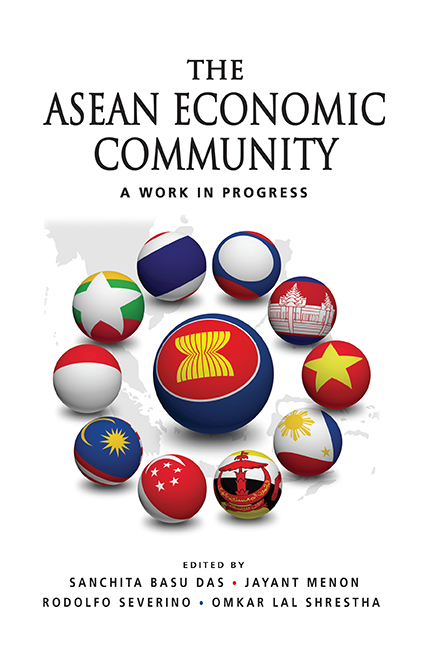Book contents
- Frontmatter
- Contents
- Foreword
- Foreword
- Preface
- acknowledgments
- Abbreviations
- The Contributors
- 1 Overview
- 2 Non-Tariff Barriers: A Challenge to Achieving the ASEAN Economic Community
- 3 ASEAN Trade in Services
- 4 The Asean Economic Community: The Investment Climate
- 5 Competition and Intellectual Property Laws in the ASEAN ‘Single Market’
- 6 Subregional Zones and ASEAN Economic Community
- 7 ASEAN FTAs: State of Play and Outlook for Asean's Regional and Global Integration
- 8 The Asean Dispute Settlement System
- 9 Enhancing the Institutional Framework for AEC Implementation: Designing Institutions that are Effective and Politically Feasible
- 10 ASEAN Economic Community Business Survey
- Index
5 - Competition and Intellectual Property Laws in the ASEAN ‘Single Market’
Published online by Cambridge University Press: 21 October 2015
- Frontmatter
- Contents
- Foreword
- Foreword
- Preface
- acknowledgments
- Abbreviations
- The Contributors
- 1 Overview
- 2 Non-Tariff Barriers: A Challenge to Achieving the ASEAN Economic Community
- 3 ASEAN Trade in Services
- 4 The Asean Economic Community: The Investment Climate
- 5 Competition and Intellectual Property Laws in the ASEAN ‘Single Market’
- 6 Subregional Zones and ASEAN Economic Community
- 7 ASEAN FTAs: State of Play and Outlook for Asean's Regional and Global Integration
- 8 The Asean Dispute Settlement System
- 9 Enhancing the Institutional Framework for AEC Implementation: Designing Institutions that are Effective and Politically Feasible
- 10 ASEAN Economic Community Business Survey
- Index
Summary
Introduction
The ASEAN Economic Community (AEC) Blueprint provides a roadmap for establishing a ‘single market’ by 2015. The intent is to create a single economic market and production base as well as to enhance the competitiveness of the region and improve its attractiveness as a host location for foreign direct investment. Relative to the European Union (EU), ASEAN's notion of a ‘single market’ represents loose integration. However, even this requires countries to move beyond trade liberalization. As a result, the AEC Blueprint has set goals in a number of policy areas. This chapter examines two areas: competition policy (here limited to competition law) and intellectual property policy.
The AEC Blueprint recognizes that both the notion of fair competition and sound intellectual property policy provide static and dynamic efficiency gains. Ultimately, they ensure that firms succeed not due to monopolization and collusion but because of efficiency and innovation. Fair competition and secure intellectual property rights are aimed at improving the business environment and impacting both foreign direct investment flows and the willingness of firms to share and transfer advanced technology. Since there is no multilateral or plurilateral competition regime, every ASEAN member state has agreed to enact a national competition statute prior to 2015, and most have already done so. In the area of intellectual property, the World Trade Organization (WTO) Agreement on Trade-Related Aspects of Intellectual Property Rights (TRIPS) sets the minimum standard, as all ASEAN countries except Lao People's Democratic Republic are signatories to TRIPS. In both areas, there is no intent to harmonize laws across the region or to have regional enforcement bodies; instead, countries rely on regional networks to build capacity and enhance cooperation and coordination.
This chapter provides an assessment of the achievements thus far on the path to 2015 and draws lessons from other regional trade agreements and case law to provide a sense of likely pitfalls that ASEAN may encounter. It also highlights some yet unaddressed issues and suggests some refinements that ASEAN may wish to consider as it prepares for 2015. The next section provides a general overview of competition and intellectual property (IP) and the goals of the AEC.
- Type
- Chapter
- Information
- The ASEAN Economic CommunityA Work in Progress, pp. 207 - 278Publisher: ISEAS–Yusof Ishak InstitutePrint publication year: 2013

